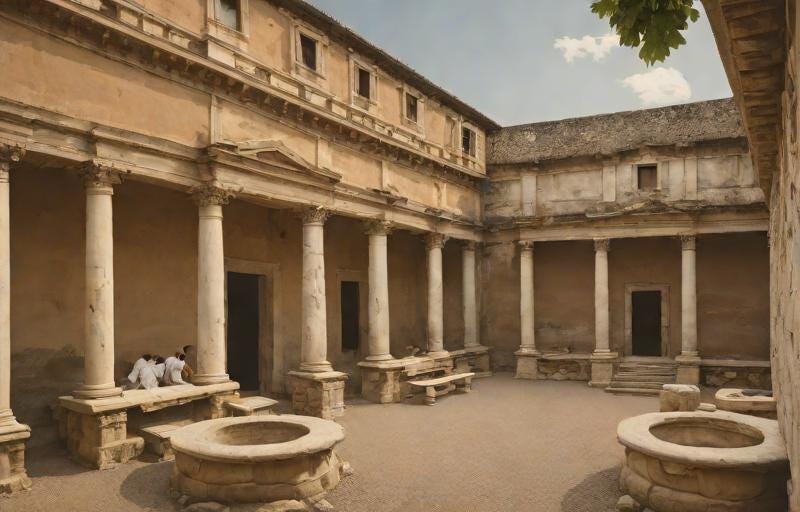In the bustling city of Ancient Rome, where marble columns and grand structures filled the streets, there was more than just impressive architecture. Believe it or not, one unique aspect of daily life in Rome was the way people socialized – and it wasn't at fancy restaurants or amusement parks. Instead, it was at communal toilets!
In Today’s Legion Journal:
Ancient Rome's Communal Toilets: A Social Gathering Spot
All Roads Lead To Rome - The History of the Birthday And The Roman Calendar, How the Cult of God Bacchus was Banned in Ancient Rome and more
A Divine Decree - The Cult of Bacchus
Gusto! - A Roman Banquet
Legacies of the Legions - The Genius Supply System of Rome’s Army | Logistics
Caesarean Psychology - The best answer to anger…
Ancient Rome's Communal Toilets: A Social Gathering Spot
Imagine a place where people chatted, laughed and caught up on the latest gossip while taking care of business. Well, in Ancient Rome, over 140 public toilets served as hubs for both hygiene and socializing.
These public toilets, known as "latrines," were not like the private bathrooms we have today. They were large, open spaces with rows of stone seats with holes in them, allowing multiple people to use them simultaneously. It might sound a bit strange to us, but back then, it was a common and accepted practice.
So, why did people choose public toilets as their social hangout? Well, in Ancient Rome, going to the bathroom wasn't just a private affair; it was a communal experience. People saw it as an opportunity to connect with friends, neighbors, and even strangers. While taking care of their personal needs, Romans would engage in conversations, share stories and discuss daily life.
These public toilets weren't hidden away; they were often located in busy areas, like marketplaces and public squares. It was a central place where people from all walks of life could come together, creating a unique social environment.
In a way, communal toilets in Ancient Rome served a dual purpose – not only were they essential for maintaining cleanliness and sanitation but they also played a surprising role in building community bonds. So, next time you think about the ancient world, remember that even the most unexpected places, like public toilets, played a part in shaping the social fabric of societies like Ancient Rome.
All Roads Lead To Rome
Byzantine gold coin with 'face of Jesus' unearthed by metal detectorist in Norway
A metal detectorist stumbled upon a rare gold coin while exploring the mountains in southern Norway.
Did an Artificial Sweetener Destroy the Roman Empire? (Video)
Fascinating Discoveries And Insights About Roman History
Tree ring study suggests drought encouraged Attila’s Huns to attack the Roman Empire
Who Was Emperor Aurelian?
Leptis Magna, Known As A Jewel Of The Roman Empire, Lays ...
Why Was the Roman Indian Ocean Trade Important?
Who was Sponsian? The 'fake Roman emperor' who proved to ...
Ancient Rome's greatest buildings | Sky HISTORY TV Channel
A Warning for Today's Super Rich From Ancient Rome's ...
Why Is the Battle of Yarmouk So Important?
Is the Famous Roman Leader Pompey History's Biggest Loser?
What Are the Theodosian Walls (of Constantinople)?
The History of the Birthday And The Roman Calendar
Augustus and the Salvation of Rome | James Hankins
What was Roman Christianity called?
Why did Romans stop believing in gods?
How the Cult of God Bacchus was Banned in Ancient Rome
5 Ancient Greek and Roman Superstitions Still Alive Today
Did Romans Have So Much Sex That A Plant Went Extinct?
This Ancient Roman Temple Is Considered One Of The Best Preserved Today, And You Can Visit
How did the Romans celebrate Christmas? (Freya Edwards, Christ's Hospital)
A Divine Decree
The Cult of Bacchus
Gusto!
Roman Banquet
Legacies of the Legions -
The Genius Supply System of Rome’s Army | Logistics
Caesarean Psychology
The best answer to anger is silence.
Marcus Aurelius
Who else do you know that should be thinking more about the Roman Empire?





